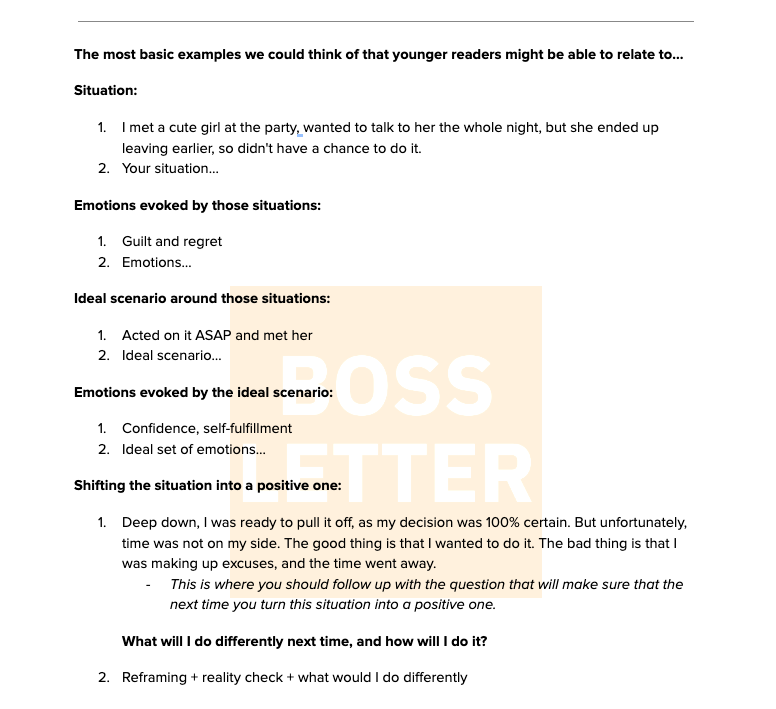What It Takes To Build Unbreakable Mindset
102: Achieve what most only dream about.
Welcome reader! Why do some people have it easier than others? Yet they didn’t come from wealthy backgrounds? Zero hidden talents. No extraordinary skills. What don’t they want you to know? They all have an unbreakable mindset.
Unbreakable Mindset?
Additional reading on mindset:
Mindset is everything: What most people fail to realize is that creating the life you want starts with the right mindset. Positive one. No matter what is happening in your life. The first battle you will have is the one in your head. To be the best you can be, you need to think like the best in the world does. How do the best in the world think? Pretty delusional when you think about it. Don’t believe this is true? Michael Jordan and Tiger Woods are perfect examples of elite performers (an absolute gem of the interview). Our idea is not to talk about external motivation or getting pumped up by watching MJ videos. What we are talking about here is the internal game. The first battle? Repeating ourselves… Your head. Unbreakable beliefs about yourself, your knowledge, and a deep understanding of who you are. All of those matter. The ultimate goal is to possess a proper mindset and apply it to all areas of your life. The best part about it? There will be a realization that people who achieve great things do so because they believe they can achieve them in the first place. The only way to win is to win over your mind and turn it into a support system.
How do winners think: The difference between someone starting with mindset work and trying to get better and someone who has practiced mindset for years comes down to the basics. 1) Consistency. The reason some people keep winning is that they can apply their own set of principles 24/7 without losing control. This is extremely hard, and all those who have tried to stick to something that is not "visible" know what we are talking about. The average person complains about how hard it is to lose weight (visible results). Now imagine how hard it is for them to change their internal systems? It is also one of the main reasons why those who are just starting will experience the most problems. It's easy to forget something when your muscle memory (brain memory) is off. 2) Effort. The consistency without effort means nothing. This applies to everything in your life. 3) Being open-minded. What are we preaching in posts like this? It won't work unless you're open to things they didn’t teach you in school or that your friends have not mentioned. Maybe that is the reason why you don’t support their lifestyle. Mental work and figuring out what is holding you back will never work without you being open-minded. Mental work and removing negative beliefs about yourself to achieve the mindset you want? It won't work without being open-minded. Simple as that. The last piece of the puzzle? Obsession. These three components mean nothing without being obsessed with getting better and improving your positioning. They mean nothing. Consistency and obsession reinforce each other - effort is necessary. It is all connected, and one won't work without the others.
Consistency + Effort + Being open-minded + Obsession = Winner’s mindset.
What does it take to go a step further from the winners mindset? It’s the ability to not give up on yourself when things get hard. No matter what you are doing or trying to achieve. There will be moments when you hit a wall. Things will not go as planned, or you will be straight up disappointed with the progress you are making. If you are making progress in the first place. This is something that happens to everyone. Those who run their own business know exactly what we're talking about. At the same time, you must realize that you are the one taking full responsibility for what is happening. Recognize deep down that you have complete control over the situation, instead of thinking that things are happening to you. Your goal? Let go of the victim mindset and take control of what you can. The interesting part is that when you start to reflect on your situation, you will realize that you can control about 98% of what happens in your life and how you respond.This doesn't include those life-changing moments or major tragedies that no one is prepared for. Other situations? Likely solvable with a few mindset tweaks, and the answer you are looking for. The key to an unbreakable mindset? Understanding that you have complete control over it. Not just over your mind, but also over your life. It is not about quick results (which don’t exist in the case of mindset). It is more about the action and the effort you put in. Building your internal system and giving yourself feedback on what you are doing is the right. Not only is it right, but it is also necessary and will bring what you need. This is something that won’t come naturally, and you will have to work at it. Removing internal limitations, scarcity, and reinforcing positive self-beliefs… Once you start diving deeper into it eventually, it will all click, and you will realize that you have complete control over your mind. What does it mean when you have full control over your mind? That you have complete control over your life. Removing yourself completely from a victim mindset and shifting toward an unbreakable one.
Winner’s mindset + Understanding That You Have Full Control Over Your Life = Unbreakable mindset
How To Achieve An Unbreakable Mindset + Requirements
Requirements
Self-assessment: Everything starts with honest self-evaluation and a necessary reality check. Exploring your emotions and how to respond to them, to the point of being able to reframe them? It only happens with the proper self-assessment. The real change begins when you can identify your emotions. Giving you insight into how you react and what is holding you back. Knowing what emotions drive your behaviour and in which way is a superpower. Limiting beliefs, scarcity mindset, and inability to create connections with the people around you. What is important about mental self-assessment is that you need to be 100% transparent with yourself. It is not an easy thing to do. The reason it is not easy is that most people are trying to cover up their true emotions and beliefs. How many times have you had a situation where you would burst out in anger (and you knew it), but told everyone it was for a different reason? Part of that is because you feel the need to hide it from society, and part of it is because you’re not being truthful with yourself. What about a scarcity mindset? Have you ever wanted to start a business (or any big project), but your inner voice told you the market has already been saturated? Playing unnecessary defense because your internal system is confused about who you are. Basic examples that most people can relate to, as they have experienced them. If you are wondering how to do a self-assessment and what the proper way to do it is… There is no correct answer. Everyone’s answer will be different. Below is one approach to take.
Requirements for self-assessment:
Being open-minded and fully transparent with yourself
15-25 minutes of peace
Ability to recognize your emotions and how certain situations affect you
Pen and paper
Self-assessment exercises
Take a pen and paper and start writing about a few situations you have recently experienced that challenged you. Your emotions or made you feel something. Wanted to ask someone to connect with you about a business opportunity, but you got scared? Basic example. Wanted to start a new hobby you have been talking about for the last 6 months, but today isn't the right day because you don’t have time? Most likely, a scarcity mindset is coming through. Not a real-time management problem. These are the examples you are looking for. Write down the things that made you feel something. Another practical piece of advice is to write down the things that have stuck with you. Why? Because things that have stuck with us usually carry certain emotions. The goal of the assessment? To help you identify how certain things made you feel and where those feelings are coming from.
Focusing on recent situations in your life will make this exercise more effective. 3-5 situations are all you need to pull this assessment off. This assessment should be repeated at least once per month.
While writing about situations you have experienced. Pay attention to how those situations made you feel. Did you notice any sensations? Pain? FOMO? Feeling like someone punched you in the stomach? These are all signs you want to pay attention to. Write those feelings down next to those situations. You want to understand what is holding you back.
What would happen if you did not act on these emotions? Ask yourself this question and dig deeper. What would happen if I acted on them as I truly wanted? The goal is to look for a different scenario. One that you would prefer over the other. Once you find it, analyze what emotions it evokes. Victory? Confidence? You want to list all of those emotions that different scenarios or outcomes evoke.
At this stage of the assessment, you should have: 1) situations that you have experienced and had an impact on you, 2) a list of emotions those situations evoked, 3) an ideal scenario, and 4) a list of emotions based on that ideal scenario. The final step? Start asking yourself the right questions. Reframing the beliefs and emotions around them. What if I already have enough? What if doing that thing in the first place was not worth it? What if I knew how to do it, but the timing was not right? Always seek out situations that shift your perception toward a more positive scenario. Results? It should provide you with all the necessary information. Better said, the outcome of your assessment. Still holding onto negative or limiting beliefs about yourself and the situations you experience daily? Work harder. Feeling more optimistic about your situation and the situations you are experiencing daily? There is always more work to do. But you are on the right track.
Visual type? We got you covered…




